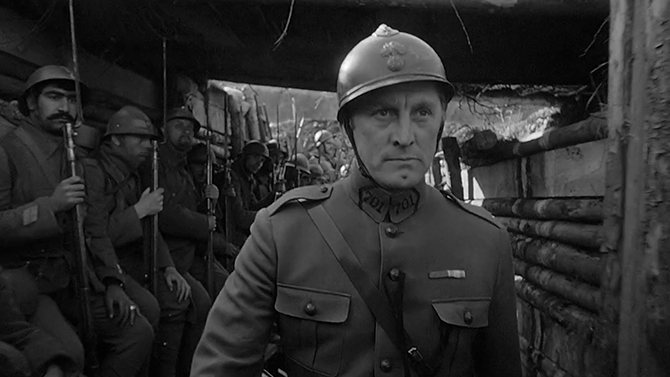Stanley Kubrick, one of the great directors of the 20th Century, was a unique artist who was able to experiment with many different genres throughout his four plus decades of work. From film noir to horror, Kubrick’s movies were varied so that no two were similar, other than perhaps in theme. Of his 13 motion pictures, only two were war based, with the 1987 Vietnam narrative Full Metal Jacket being one of his most iconic. Yet, I am going to talk about his earlier anti-war film, the 1957 classic Paths of Glory.
This movie, considered one of the greatest anti-war films ever made, finds French Colonel Dax (Kirk Douglas – in an excellent performance) and his troops of the 701st regiment in the brutal trenches during World War I; while an ambitious General, Mireau (George Macready), orders Dax to send his men to capture the fortified German position known as ‘the anthill’.
It is a hopeless mission. We watch as Dax leads his troops into ‘no man’s land’ and they fall around him. He then backtracks to the second company of soldiers who are not even able to make it out of the trenches due to the heavy artillery fire and tries to persuade them to complete the precisely-timed attack.
This film is basically separated into two parts. The first, mentioned above, has a few moments of note. Many of the tracking shots in the trenches that follow either Dax or Mireau are artistically done and very informative. We see the bravery and leadership qualities that a man like Dax has and the disconnect that Mireau has with the troops. Also, the scouting and war scenes are extremely well done, with a disturbing view of the horrors of World War I. Finally, the lavish castle where Dax gets his orders from Mireau shows the great discrepancy between the upper echelon of the military and the men in the trenches.
The second part of the motion picture follows Dax as he defends three of his men – Corporal Paris (Ralph Meeker), Private Ferol (Timothy Carey – who is once again superb in a Kubrick film; the other was The Killing), and Private Arnaud (Joe Turkel), who are unfairly put on trial as an example of the cowardice displayed by the troops under his command. The trial takes place in an opulent room with the sun shining in, once again showing the symbolic dichotomy between these soldiers and those running the trial in the gilded manor. It does not feel like the men are being given a fair chance from the start and Dax tries to defend them with all the passion and knowledge he can muster (as he was a successful lawyer before the war). As you can probably guess, as this is an anti-war film, the climax is quite jarring and graphic. It depicts the folly of man and the atrocities of war.
The final scene of the film is that of a captured girl (Kubrick’s future wife) forced to sing for the troops. A feeling of disgust envelops us as we watch the rowdy men heckle her, but then the scene transitions into something much more hopeful. Does it erase everything else that we have seen up to this point? No, but it does give one the feeling that these hardened soldiers have not completely lost their souls. It is a moving and thought-provoking take that highlights the unity of man.
Paths of Glory is a film that chastises the vanity of man. We see that the loss of life means nothing to Mireau if it helps to elevate his station thereby revealing the frivolous and selfish nature of his actions. This is not a movie that sugarcoats the atrocities of war, but rather, displays the futility and ugliness of it. This film does not shoot to thrill, alternatively, it depicts that war and the games generals’ play create a hellish landscape of damaged souls.
Part of the Criterion Collection


“It depicts that war and the games generals’ play create a hellish landscape of damaged souls” very well written Nikolai, l look forward to watching this film.
I thank you. Hopefully you enjoy it. Sadly, Kubrick’s early work is never talked about as much as his later films. It always seems like people start with 1960’s Spartacus and somehow miss out on his first few features.